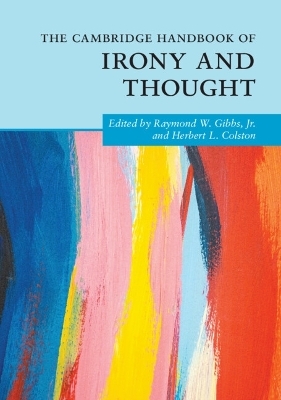
The Cambridge Handbook of Irony and Thought
Cambridge University Press (Verlag)
978-1-108-97832-3 (ISBN)
The Cambridge Handbook of Irony and Thought offers the first comprehensive collection of chapters in multidisciplinary irony scholarship. These chapters explore the significance of irony, both verbal and situational, in language, thought, human action, and artistic expression. They cover five main themes: the scope of irony in human experience; irony's impact (both personal and in social life); irony in linguistic communication; irony and affect, and irony in expressive contexts. Contributions come from a wide range of academic disciplines, including psychology, linguistics, philosophy, literature, computer science, film and media studies, and music, making this a truly cross-disciplinary collection of benefit to a wide range of students and researchers.
Raymond W. Gibbs, Jr. is an independent cognitive scientist and former Distinguished Professor of Psychology at the University of California, Santa Cruz, USA. His research interests focus on embodied cognition, pragmatics, and figurative language. He is the author of many books, including The Poetics of Mind: Figurative Thought, Language and Understanding (1994), Intentions in the Experience of Meaning (1999), Embodiment and Cognitive Science (2006), Metaphor Wars: Conceptual Metaphor in Human Life (2017), and Interpreting Figurative Meaning (2012), all published by Cambridge University Press. He is also editor of The Cambridge Handbook of Metaphor and Thought (2008). Herbert L. Colston is a Professor at the University of Alberta, USA. His research involves figurativity broadly construed, including its social and embodied underpinnings. He is Editor-in-Chief of Metaphor & Symbol (Taylor & Francis Journal) and co-Editor of Figurative Thought and Language (John Benjamins Book Series). His most recent book is How Language Makes Meaning: Embodiment and Conjoined Antonymy (2019).
Part I. Introduction: 1. Irony and thought: the state of the art Raymond W. Gibbs, Jr. and Herbert L. Colston; Part II. The Scope of Irony: 2. Kinds of irony: a general theory Gregory Currie; 3. Irony and cognitive operations Francisco Ruiz de Mendoza; 4. The varieties of ironic experience Raymond W. Gibbs, Jr., Patrawat Samermit and Christopher Karzmark; Part III. Irony's Impact: 5. Irony as social work: opposition, expectation violation, and contrast Herbert Colston; 6. Rorty, irony and neoliberalism Claire Colebrook; 7. Irony and its consequences in the public sphere Paul Simpson; Part IV. Irony in Linguistic Communication: 8. Constructions in verbal irony production: the case of rhetorical questions Angeliki Athanasiadou; 9. Tracking the ironical eye: eye tracking studies on irony and sarcasm Salvadore Attardo; 10. Inferring irony online Francisco Yus; 11. Irony and thought: developmental insights Penny Pexman; 12. Vocal strategies in ironic communication Gregory Bryant; 13. Great expectations and EPIC fails: a computational perspective on irony and sarcasm Tony Veale; Part V. Irony, Affect and Related Figures: 14. Irony and humor Marta Dynel; 15. Emotional responses to sarcasm Ruth Filik; 16. Irony, exaggeration and hyperbole: no embargo on the cargo! John Barnden; 17. Irony and its overlap with hyperbole and understatement Laura Neuhaus; 18. Irony and satire Christian Burgers; 19. Hypocrisy and situational irony Cameron Shelley; Part VI. Irony in Expressive, Nonlinguistic Media: 20. Ironies in film James McDowell; 21. An ear for irony Katherine Turner and Sabatino DiBernardo; 22. Pictorial irony and sarcasm Albert Katz.
| Erscheinungsdatum | 28.11.2023 |
|---|---|
| Reihe/Serie | Cambridge Handbooks in Psychology |
| Zusatzinfo | Worked examples or Exercises |
| Verlagsort | Cambridge |
| Sprache | englisch |
| Gewicht | 267 g |
| Themenwelt | Geisteswissenschaften ► Psychologie ► Allgemeine Psychologie |
| Geisteswissenschaften ► Psychologie ► Verhaltenstherapie | |
| ISBN-10 | 1-108-97832-0 / 1108978320 |
| ISBN-13 | 978-1-108-97832-3 / 9781108978323 |
| Zustand | Neuware |
| Informationen gemäß Produktsicherheitsverordnung (GPSR) | |
| Haben Sie eine Frage zum Produkt? |
aus dem Bereich


